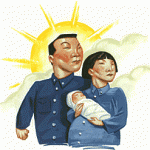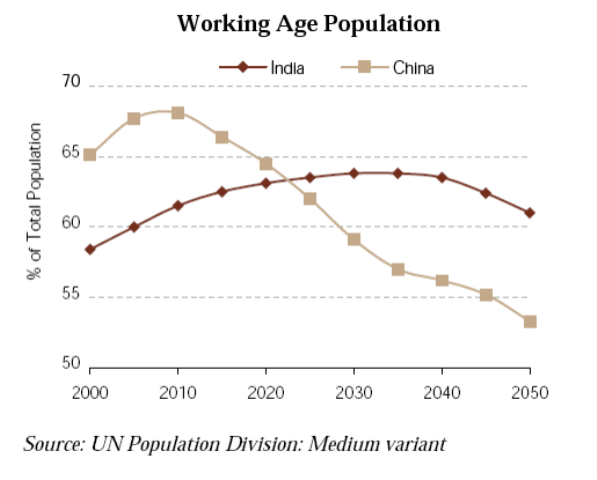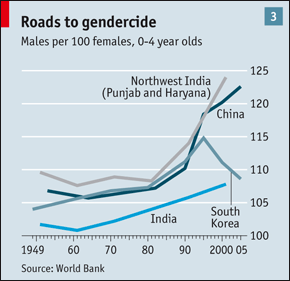The One Child Policy (一胎化政策) Posted by Stephen on Oct 13, 2011 in Culture
 The one-child policy or 计划生育政策 (jìhuà shēngyù zhèngcè) is a population control policy of the People’s Republic of China that has been implemented in the mainland for over thirty-five years now. Born out of the Open Door Policy and a wave of sweeping economic reforms, the one-child policy addressed growing population and resource concerns, and would forever alter the demographic landscape of mainland China.
The one-child policy or 计划生育政策 (jìhuà shēngyù zhèngcè) is a population control policy of the People’s Republic of China that has been implemented in the mainland for over thirty-five years now. Born out of the Open Door Policy and a wave of sweeping economic reforms, the one-child policy addressed growing population and resource concerns, and would forever alter the demographic landscape of mainland China.
How it works is simple. The government, by imposing economic incentives (or punishments), urges couples to have only one child per household. If you are an urban, city-dweller, you are almost entirely restricted to one child, unless you are willing to pay a large amount of money that only the elite can afford.
The Chinese government provides a slew of health care and planned parenthood services to women mainly to urge the healthy development, birth and growth of one child per family, not two. This includes government paid for contraception and even early term abortions. Now you know why John Boehner (U.S. conservative/anti-abortion advocate) is so furious with China. In the mainland there isn’t as much of a cultural stigma against planned parenthood and believe it or not, GOP members, is seen as a benefit to society.
The one child policy is enforced at a provincial level by the Population and Family Planning Commissions or 计划生育委员会 (Jìhuà Shēngyù Wěiyuánhuì) through fines that are imposed based on the income of the family and other factors (think of it as a progressive birth tax). But as with the tax code, there are always loopholes, and interestingly enough, there aren’t as many one child families as you’d think.
A spokesperson of the Committee on the One-Child Policy has said that approximately 36% of China’s population is currently subject to the one-child restriction, dispelling the myth that all (or even the majority) of Chinese families live under this rule. That’s because like the tax system, there are exceptions, exemptions and loopholes (predominantly for the wealthy).
 The one child policy allows exemptions for several cases, including rural couples (non-urban dwellers or farmers), ethnic minorities (Uighurs, Tibetans, etc…), and parents without any siblings themselves. If you’ve lost a child, you are allowed to have another. If you and your spouse are both only children, then you are allowed to have more than one child. You can also elect to pay the steep fines for having another child, but few families in China can afford such a strain on their wallets.
The one child policy allows exemptions for several cases, including rural couples (non-urban dwellers or farmers), ethnic minorities (Uighurs, Tibetans, etc…), and parents without any siblings themselves. If you’ve lost a child, you are allowed to have another. If you and your spouse are both only children, then you are allowed to have more than one child. You can also elect to pay the steep fines for having another child, but few families in China can afford such a strain on their wallets.
Then there are the more “clever” ways around the policy, that involve evasion, corruption and collusion. Because population control is measured at a provincial level, paying off or colluding with a local official is much easier to do, and as a result, occurs quite frequently.
But even with these exceptions to the one child policy, population control has been stark in the mainland as demographics have altered dramatically. These are the (unintended) consequences of this demographic numbers game.
The Numbers Game:
Since the one child policy was introduced in 1978 the Chinese government claims it has prevented 400 million births (2011 numbers). 400 million people! That’s larger than the population or the United States (3rd most populated country in the world). Now considering how overpopulated and polluted China is now, imagine having 4oo million more people in the mainland. China would be nearly TWICE the population of India.
Without this policy, the mainland would be one very crowded place. Regardless of where you side morally with population control, it does appear to have alleviated a potential population explosion crisis. That being said, playing the demographics game is dangerous for any society and can lead to even longer-term problems, previously unconsidered.
From an economic standpoint, forcing two parents to provide only one child will inevitably lead to many ills of demographic decline (such as in Italy and Japan). Known as the “4-2-1 Problem”, as the first generation of law-enforced only children came of age for becoming parents themselves, one adult child was left with having to provide support for his or her two parents and four grandparents.
This leaves the older generations with increased chances of dependency on retirement funds or charity in order to receive support from a singular child. As time progresses, more and more of the total population will be unable to work or garner income/GDP, leaving the minority of younger generations to carry the economy.
 If personal savings, pensions, or state welfare fail, most senior citizens would be left entirely dependent upon their very small family or neighbours for assistance. This creates a huge drain on society and health care, not to mention the only children who have to foot the bill of their parents and their own families. In essence this offsets the costs of larger, older generations to smaller younger ones, causing debt-imbalance that makes Social Security in the U.S. look like a fair rub.
If personal savings, pensions, or state welfare fail, most senior citizens would be left entirely dependent upon their very small family or neighbours for assistance. This creates a huge drain on society and health care, not to mention the only children who have to foot the bill of their parents and their own families. In essence this offsets the costs of larger, older generations to smaller younger ones, causing debt-imbalance that makes Social Security in the U.S. look like a fair rub.
Psychologically, many parents worry about the growing trend toward over-indulging your one and only child. Known as “little emperors” (小皇帝) a new class of over pampered and over nurtured children are emerging that many feel are socially inept, lazy and incapable of properly functioning within society. I’m not sure if it’s fair to place the blame solely on the policy for this little emperors because parents are just as culpable (if not more so). Everyone thinks their kid is special. Get over it.
But even more sinister, and likely the most devastating unintended consequence of the one child policy, has been on the decline of the female population. An estimated 163 million women are believe to have been lost to the one child policy in Asia, due to male child bias and preference. The result is a Chinese society with a 118:100 ratio of males to females. While there is too much to cover at the end of this post, the next post will discuss how unequal male-female demographics can be devastating on society, the economy and even a country’s long-term growth and prosperity. Stay tuned.
Follow Steve on twitter: @seeitbelieveit

Build vocabulary, practice pronunciation, and more with Transparent Language Online. Available anytime, anywhere, on any device.
About the Author: Stephen
Writer and blogger for all things China related. Follow me on twitter: @seeitbelieveit -- My Background: Fluent Mandarin speaker with 3+ years working, living, studying and teaching throughout the mainland. Student of Kung Fu and avid photographer and documentarian.






Comments:
izabella:
nice summary. here’s a recent news article about male/female ratio in China – http://thinkingchinese.com/index.php?page_id=343
Steve:
@izabella Thanks, izabella. This is great. I am actually planning to do the next post on the unbalanced gender ratio and the reported “163 million lost women” caused in part by the one child policy. I’ll include a link to this in that post.
Thanks for following.
-S
Ken Jones:
” In the mainland there isn’t as much of a cultural stigma against planned parenthood and believe it or not, GOP members, is seen as a benefit to society.” Fascinating. I don’t think it was viewed as beneficial by the 300 million citizens who were denied the opportunity to join the society. Why do you suppose that the government puts such a low value on the most fundamental right of its people?
Steve:
@Ken Jones Hi Ken,
To answer you’re question, I’d say that it’s cultural and historical. China doesn’t have a history of individualism, democracy or human rights. Chinese people don’t see it as denying someone the ability to live, but rather, making life for everyone else better by making a more “harmonious society”. Here the good of the masses outweight the rights of the individual few. I’m not coming down one side or the other on it morally, but that’s how the one child policy is perceived perceived in China: as an unfortunate necessity.
-S
Ken Jones:
Hi Steve, thanks for responding. I see the OCP as evidence of a morally bankrupt society, but we in the States are no better in this regard; we kill about a million citizens in utero each year. One trouble with this kind of harmony is that the solution to the 4 2 1 problem will be found to be euthanasia; it’s a slippery slope, but a logical, harmonious conclusion. Scary.